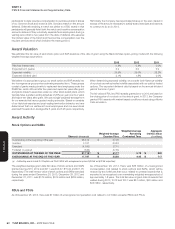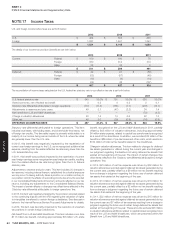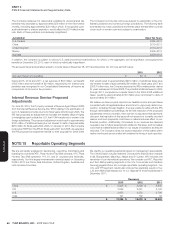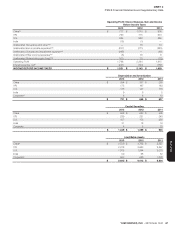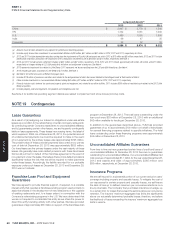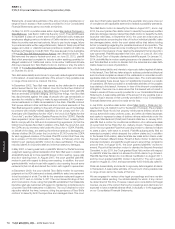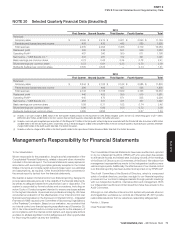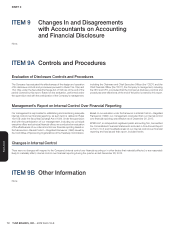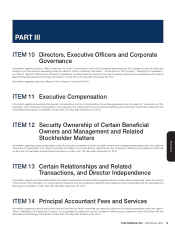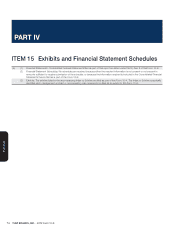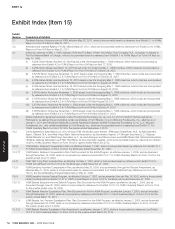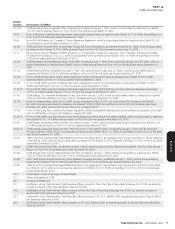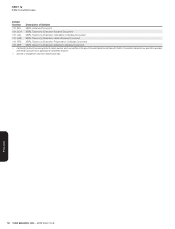Pizza Hut 2013 Annual Report Download - page 166
Download and view the complete annual report
Please find page 166 of the 2013 Pizza Hut annual report below. You can navigate through the pages in the report by either clicking on the pages listed below, or by using the keyword search tool below to find specific information within the annual report.
YUM! BRANDS, INC.-2013 Form10-K70
Form 10-K
PART II
ITEM 8Financial Statements andSupplementaryData
Statements. A reasonable estimate of the amount of any possible loss or
range of loss in excess of that currently provided for in our Consolidated
Financial Statements cannot be made at this time.
On May 16, 2013, a putative class action styled Bernardina Rodriguez v.
Taco Bell Corp. was filed in California Superior Court. The plaintiff seeks
to represent a class of current and former California hourly restaurant
employees alleging various violations of California labor laws including
failure to provide meal and rest periods, failure to pay hourly wages, failure
to provide accurate written wage statements, failure to timely pay all final
wages, and unfair or unlawful business practices in violation of California
Business & Professions Code §17200. This case appears to be duplicative
of the In Re Taco Bell Wage and Hour Actions case described above. Taco
Bell removed the case to federal court and, on June 25, 2013, plaintiff
filed a first amended complaint to include a claim seeking penalties for
alleged violations of California’s Labor Code under California’s Private
Attorneys General Act. Taco Bell’s motion to dismiss or stay the action
in light of the In Re Taco Bell Wage and Hour Actions case was denied
on October 30, 2013.
Taco Bell denies liability and intends to vigorously defend against all claims
in this lawsuit. A reasonable estimate of the amount of any possible loss
or range of loss cannot be made at this time.
In December 2002, Taco Bell was named as the defendant in a class
action lawsuit filed in the U.S. District Court for the Northern District of
California styled Moeller, et al. v. Taco Bell Corp. In August 2003, plaintiffs
filed an amended complaint alleging, among other things, that Taco Bell
hasdiscriminated against the class of people who use wheelchairs or
scooters for mobility by failing to make its approximately 200 Company-
owned restaurants in California accessible to the class. Plaintiffs contend
that queue rails and other architectural and structural elements of the
Taco Bell restaurants relating to the path of travel and use of the facilities
by persons with mobility-related disabilities do not comply with the U.S.
Americans with Disabilities Act (the “ADA”), the Unruh Civil Rights Act (the
“Unruh Act”), and the California Disabled Persons Act (the “CDPA”). Plaintiffs
have requested: (a) an injunction from the District Court ordering Taco
Bell to comply with the ADA and its implementing regulations; (b) that the
District Court declare Taco Bell in violation of the ADA, the Unruh Act, and
the CDPA; and (c) monetary relief under the Unruh Act or CDPA. Plaintiffs,
on behalf of the class, are seeking the minimum statutory damages per
offense of either $4,000 under the Unruh Act or $1,000 under the CDPA
for each aggrieved member of the class. Plaintiffs contend that there may
be in excess of 100,000 individuals in the class. In February 2004, the
District Court granted plaintiffs’ motion for class certification. The class
included claims for injunctive relief and minimum statutory damages.
In May 2007, a hearing was held on plaintiffs’ Motion for Partial Summary
Judgment seeking judicial declaration that Taco Bell was in violation of
accessibility laws as to three specific issues: indoor seating, queue rails
and door opening force. In August 2007, the court granted plaintiffs’
motion in part with regard to dining room seating. In addition, the court
granted plaintiffs’ motion in part with regard to door opening force at some
restaurants (but not all) and denied the motion with regard to queue lines.
In December 2009, the court denied Taco Bell’s motion for summary
judgment on the ADA claims and ordered plaintiffs to select one restaurant
to be the subject of a trial. The trial for the exemplar restaurant began on
June 6, 2011, and on October 5, 2011 the court issued Findings of Fact
and Conclusions of Law ruling that plaintiffs established that classwide
injunctive relief was warranted with regard to maintaining compliance as to
corporate Taco Bell restaurants in California. The court declined to order
injunctive relief at the time, however, citing the pendency of Taco Bell’s
motions to decertify both the injunctive and damages class. The court
also found that twelve specific items at the exemplar store were once out
of compliance with applicable state and/or federal accessibility standards.
Taco Bell filed a motion to decertify the class in August 2011, and in July
2012, the court granted Taco Bell’s motion to decertify the previously certified
state law damages class but denied Taco Bell’s motion to decertify the ADA
injunctive relief class. In September 2012, the court set a discovery and
briefing schedule concerning the trials of the four individual plaintiffs’ state
law damages claims, which the court stated will be tried before holding
further proceedings regarding the possible issuance of an injunction. The
court subsequently issued an order modifying its October 2011 Findings
of Facts and Conclusions of Law deleting the statement that an injunction
was warranted. Plaintiffs appealed that order, and on June 24, 2013 the
Ninth Circuit Court of Appeals dismissed plaintiff’s appeal. On January 15,
2014, plaintiffs filed a motion seeking issuance of a classwide injunction,
and Taco Bell filed a motion to dismiss both the individual and class ADA
claims based on a lack of jurisdiction.
Taco Bell denies liability and intends to vigorously defend against all claims
in this lawsuit. Taco Bell has taken steps to address potential architectural
and structural compliance issues at the restaurants in accordance with
applicable state and federal disability access laws. The costs associated
with addressing these issues have not significantly impacted our results
of operations. We have provided for a reasonable estimate of the possible
loss relating to this lawsuit. However, in view of the inherent uncertainties
of litigation, there can be no assurance that this lawsuit will not result in
losses in excess of those currently provided for in our Consolidated Financial
Statements. A reasonable estimate of the amount of any possible loss or
range of loss in excess of that currently provided for in our Consolidated
Financial Statements cannot be made at this time.
In July 2009, a putative class action styled Mark Smith v. Pizza Hut, Inc.
was filed in the U.S. District Court for the District of Colorado. The complaint
alleged that Pizza Hut did not properly reimburse its delivery drivers for
various automobile costs, uniforms costs, and other job-related expenses
and seeks to represent a class of delivery drivers nationwide under the
Fair Labor Standards Act (FLSA) and Colorado state law. In January 2010,
plaintiffs filed a motion for conditional certification of a nationwide class
of current and former Pizza Hut, Inc. delivery drivers. However, in March
2010, the court granted Pizza Hut’s pending motion to dismiss for failure
to state a claim, with leave to amend. Plaintiffs subsequently filed an
amended complaint, which dropped the uniform claims but, in addition
to the federal FLSA claims, asserted state-law class action claims under
the laws of sixteen different states. Pizza Hut filed a motion to dismiss the
amended complaint, and plaintiffs sought leave to amend their complainta
second time. In August 2010, the court granted plaintiffs’ motion to
amend. Pizza Hut filed another motion to dismiss the Second Amended
Complaint. In July 2011, the Court granted Pizza Hut’s motion with respect
to plaintiffs’ state law claims but allowed the FLSA claims to go forward.
Plaintiffs filed their Motion for Conditional Certification in August 2011,
and the Court granted plaintiffs’ motion in April 2012. The opt-in period
closed on August23, 2012, and approximately 6,000 individuals opted in.
Pizza Hut denies liability and intends to vigorously defend against all claims
in this lawsuit. A reasonable estimate of the amount of any possible loss
or range of loss cannot be made at this time.
We are engaged in various other legal proceedings and have certain
unresolved claims pending, the ultimate liability for which, if any, cannot
be determined at this time. However, based upon consultation with legal
counsel, we are of the opinion that such proceedings and claims are not
expected to have a material adverse effect, individually or in the aggregate,
on our Consolidated Financial Statements.




